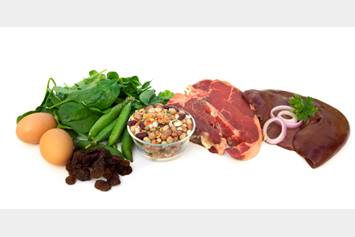Anemia: Iron Deficiency
To help prevent anemia, your child should eat foods rich in iron and high in vitamin C and at the same time.
Iron deficiency anemia (EYE-urn di-FISH-un-see ah-NEE-me-ah) means there is not enough iron in the red blood cells. Our bodies do not make iron. We get it from the foods we eat.
Iron is important because it helps build red blood cells. Red blood cells deliver oxygen throughout the body so we grow, think and function normally. An anemic child gets tired easily, looks pale, has a poor appetite and may have headaches.
Anemia can happen in children during rapid growth spurts between the ages of 6 months and 36 months and during adolescence. Adolescent girls are at greater risk if they have heavy menstrual bleeding and poor eating habits. To help prevent anemia, your child should eat foods rich in iron and high in vitamin C and at the same time. Vitamin C helps the body absorb more iron. Your child may also need to take an iron supplement.
There are foods that block the absorption of iron. Have your child eat these foods when not eating iron-rich foods. Below are lists of foods to help treat your child’s anemia.
Foods Containing Iron
|
Good |
Better |
Best |
|
banana |
fortified cereals, oatmeal |
beef: all red meat |
|
raisins |
enriched bread, pasta, rice |
organ meats |
|
dried fruit |
lentils and beans (except soybeans) |
pork |
|
canteloupe |
nuts, nut butters, seeds |
chicken |
|
mango |
eggs |
turkey |
|
tomato juice |
enriched tortillas |
fish |
|
potatoes (with skin) |
cooked spinach |
oysters, clams, mussels |
Foods High in Vitamin C That Help Iron Absorption
Foods high in vitamin C should be eaten at the same time as iron-rich foods. Vitamin C helps the body absorb iron.
Fruits:
- Oranges, tangerines
- Grapefruit
- Strawberries
- Mango, papaya, kiwi
- Lemons, limes
- Pineapple
- Melons
- Juices with vitamin C
Vegetables: These foods are best eaten raw or lightly cooked by steaming or microwave. Over-cooking will reduce the amount of vitamin C in them.
- Broccoli
- Red and green peppers
- Sweet and white potatoes
- Cauliflower
- Spinach, kale, leafy greens
- Winter squash
- Brussel sprouts
- Cabbage
- Tomatoes, tomato juice
Fresh fruits and vegetables are best but canned or frozen work well too.
Foods That Block Iron Absorption
Some foods can block the body from absorbing iron. Many of these foods are still important to eat. Try to eat foods high in calcium (*) and these other foods at least an hour before or after your child eats foods with iron.
- milk, cheese, yogurt*
- soy, tofu*
- chocolate
- ice cream
- grapes
- popcorn
- sardines, canned salmon*
- pomegranate
- coffee, tea
- blueberries, raspberries, blackberries
Other Tips
- Cooking foods in iron skillets and pots adds a small amount of iron to the body.
- Warning: Do not give dried fruits, nuts, peanut butter, popcorn or sunflower seeds to children under the age of 4 years until their back teeth (molars) grow in. These foods can cause choking.
Iron Supplements
- The doctor may want your child to take iron medicine. It is very important for the child to take it every day at the same time.
- Tell the doctor if your child takes a thyroid medicine, antacids or has a medical condition that may affect the way their body absorbs nutrients.
- For older children and adolescents, you can buy iron tablets over-the-counter.
- Give iron with or after meals to avoid stomach irritation. Do not give more than what is prescribed.
- If a liquid iron medicine is used, it is best to give it with an oral syringe. Follow the dose with some orange juice to help the body absorb iron better.
- After your child takes the medicine for a few days, their stool (bowel movement) may appear very dark colored. This is normal.
- Iron medicine may cause constipation, nausea or stomach pains.
- Iron medicine may stain your child's teeth. To help reduce staining, brush with baking soda or toothpaste after you give the iron medicine.
When to Call the Doctor:
Call the doctor if your child:
- develops diarrhea or vomiting
- refuses to take the iron medicine after you try to give it for 3 to 5 days
- has constipation, nausea or stomach pains
Helping Hands Patient Education Materials
Written and illustrated by medical, nursing and allied health professionals at Nationwide Children's Hospital, Helping Hand instructions are intended as a supplement to verbal instructions provided by a medical professional. The information is periodically reviewed and revised to reflect our current practice. However, Nationwide Children's Hospital is not responsible for any consequences resulting from the use or misuse of the information in the Helping Hands.
HH-I-7 | ©1978, revised 9/2020, Nationwide Children’s Hospital



